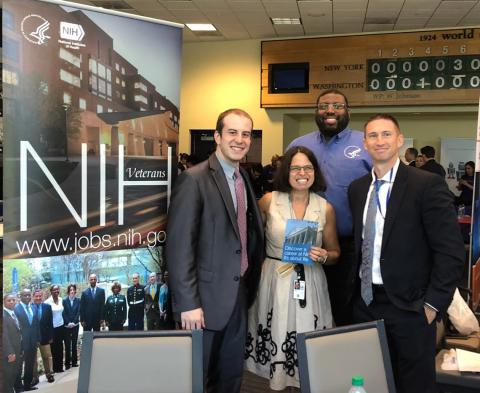In Service
Gillman Pushes Past Hardships to Help Other Vets

Photo: Dana Talesnik
A year ago, Jake Gillman attended a career fair as a veteran looking for a new opportunity. In September, he attended the same Hiring Our Heroes event at Nationals Park, this time as an NIH contractor.
“I went to the Nats Park hiring event [this year] so I could help forward veterans’ résumés to hiring officials,” said Gillman, a scientific program manager at the Center for Cellular Engineering in the Clinical Center’s department of transfusion medicine.
“When I first started going to [veteran recruiting] conferences, [I realized] after speaking with other vets out there, it takes a really long time for vets to translate their skills to the working world,” Gillman said. “I believe veterans have a strong work ethic and [most] have a core base values system that makes them work harder at their positions. That’s why I try to help as many vets as I can when I get the opportunity.”
A year earlier, Gillman fortuitously stopped by NIH’s table at Hiring Our Heroes, staffed by the Office of Human Resources’ corporate recruitment unit. There he met Dr. Tim Puetz, an operations officer at the Clinical Center and, like Gillman, an Army veteran who was planning to switch agencies. Gillman now holds Puetz’s previous position at NIH.
“Tim helped me get this position,” said Gillman. “I’d really like to keep contributing to helping other veterans, just giving back, kind of paying it forward, from what Tim had done for me.”

Gillman served in the Army National Guard for 10 years, from 2006 to 2016, starting out as a truck driver while training to teach hand-to-hand combat. Even early on, as a private, he was busy helping his fellow soldiers, managing platoon training and preparing information they needed to get promoted.
One of the biggest highlights of his military career, he said, was mentoring subordinates. “I guided some of my soldiers toward careers outside the military that they might not have known they’d be good at,” said Gillman. “That’s part of, I think, being a good leader.”
As Gillman rose through the ranks to sergeant, active guard reserve and ultimately second lieutenant, he continued overseeing all aspects of his platoon’s training to keep his unit ready to deploy at a moment’s notice.
In fact, Gillman did deploy twice, including a year-long assignment in Iraq. When he returned from overseas, he grappled with the same hardships facing many other soldiers struggling with the physical and psychological tolls of combat while trying to reacclimate to life back home.
“I didn’t feel like my family understood my deployment,” said Gillman. “I felt like I couldn’t talk to anybody who was outside of the military...When you lose a lot of time around people, you feel like you’ve lost touch with reality.”
Physically, Gillman’s deployments left him in chronic pain from multiple back injuries.
“The hardest thing is, I’m a physically active person and I just want to feel like I did before I left for combat,” he said. “I was in really good shape, but now my back is always hurting.”
Despite the pain and the persistent post-combat-related stress, Gillman stays positive, focused on mentoring opportunities and pursuing his doctorate in organizational leadership and management.
“I never thought I’d get to this point, having a master’s degree or being even close to having my Ph.D.,” said Gillman, who’s grateful to the military for paying all his tuition. “I enjoy working for my group at NIH and applying my degrees to my work. I feel like getting my M.B.A. has helped this group and [my current studies] have really helped them save money and put best clinical practices into place.”
Gillman also enjoys helping young people at NIH discover their potential. “I enjoy mentoring younger people here,” he said. “I ask their goals...and try to help them see where they might fit into the bigger picture.”
It wasn’t long ago, he reflected, that he discovered his ultimate career path. Back in high school, his friend’s mother, a radiologic technologist, gave a presentation and he became hooked. “As soon as she started showing us x-rays, I knew my passion was going to be health care.”
And now Gillman has another life transition for which he’s grateful. He and his wife are expecting a baby in December.
